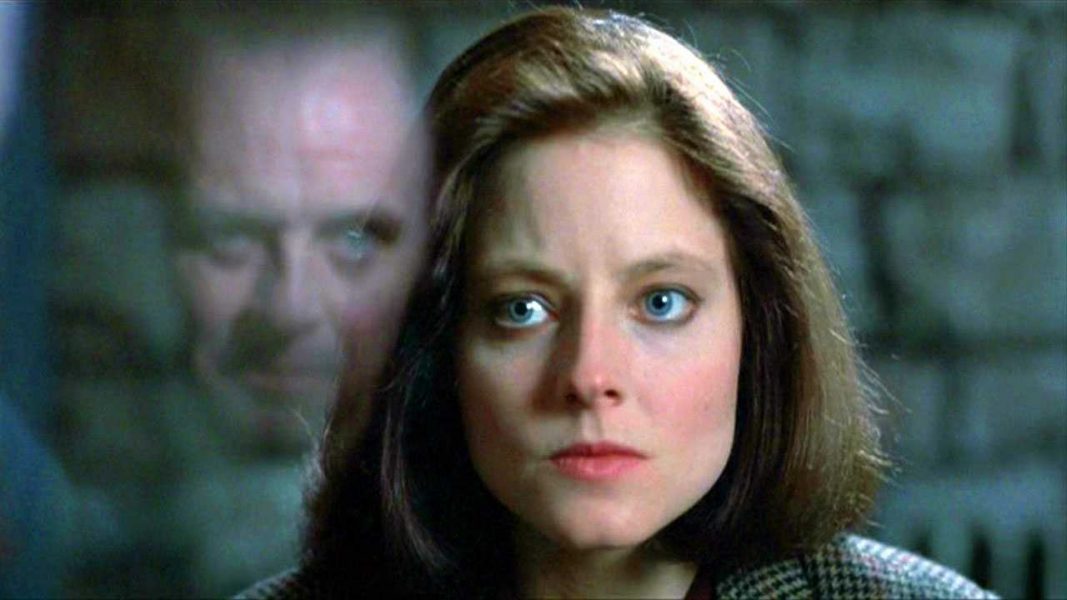Many would expect an impish Rom-Com from a director who releases his movie on a Valentine’s Day but Jonathon Demme is not your average screenwriter who appeases his audience with the expected; he delivers an unexpected.
Demme’s classic from 1991, The Silence of the Lambs, is a tantalizing story about a serial killer who looks for psychological gratification, and a FBI trainee’s struggle to catch him. A movie that combines and captures unwonted flavors of sexism, peculiar directory and impenetrable psychopaths, dawns with establishing Clarice Starling(Jodie Foster) and Dr. Hannibal Lecter(Anthony Hopkins) as it’s prime dramatis personae. The audience is made to settle with an opening scene showing Clarice running in a desolate training camp, but the most exciting sequence follows as she enters the deep, deranged bowels of Baltimore State Hospital. Dr. Hannibal Lector, once a renowned psychiatrist, stands behind the gates of hell of a corridor deep within the institution. Clarice is assigned to seek Dr. Hannibal’s brilliant psychiatric version of the serial killer the FBI is hunting. He stands behind a transparent-plastic wall: A doctor who murders and then eats them, or just their vital organs.
While an audience would expect Hopkins as a rogue doctor, ramping up our fears, what we see is a middle-aged handsome male, with soothing blue pupils and bright eyes, staring out with an expert exquisiteness of wonder. With a touch of androgyny, ironically poised composure and a skin-tight white T-shirt, Dr. Hannibal the cannibal, sends shivers down our spine when he begins to speak. His voice is almost seductive; seamlessly playful and pleasurable. The subliminal sensation that follows over the next 5 minutes is a result of Dr. Lector’s genius of olfactory powers, heightened detachment and visionary perceptions from a pool of data for his sensory visions.
Anthony Hopkins delivers the performance of his life. A dynamic actor, his oratory skills are tested in an amusing, otherworldly light where his lines are spoken in a rapid-fire stream, matching his character of mystery. A sense that besets savagery and tenderness together, his role is fascinating. Dr. Lecter’s impulses seem like a mere extension of his outstanding intelligence. In his quest to compare knowledge and gain insights, he strikes up a deal into motion with Agent Clarice: The more she reveals her secrets to him, the more he helps her catch the killer.
The storyline on her killer is so expansive and voluminous that it took histories of three different serial killers to extrapolate Buffalo Bill, the scourge of the movie. The interesting facet behind assigning an FBI agent-in-training to pursue an incarcerated psychopath is the brilliance of uncertainty that Clarice brings with her- attractiveness, girlish ingenuousness and novice skills, but the quality that wins over Dr. Lecter is her intuitive, sharp mind. Dr. Lecter, being steadfast in his quest to hold onto Clarice, methodically follows up and draws inferences for Clarice to unfold. He digress, but only so it helps Clarice rack up her intuitive mind think under the skin. He involves her mental process using her experience as a targeted female and directs it towards deciphering Buffalo Bill’s chronicle.
The conversations about Clarice’s fears, decisions and her past jump in and out between their tête-à-tête over the evidence. Dr. Lecter points at clues which he deems sharp enough for Clarice’s mind to pursue and follow. Quid pro quo. Clarice offers Dr. Lecter an insight into her life’s biggest psychological lisp: The silence of the lambs.
Jonathan Demme’s extraordinary thinking went solely behind the significance of his title; and the inspiration. While there have always been religious aspects to “Lambs”, in Christian theology especially, “Lamb” has strong overtones;
“….this sacrifice replaced the insufficient animal sacrifice of the Old Covenant; Christ the “Lamb of God” replaced the lambs’ sacrifice of the ancient Korban Todah”
Starling’s inquisitiveness to save a helpless human sheep is taken as an act of innocence and helpless by Dr. Lecter, who grows immensely absorbed when she narrates. The weight of something so enormous, and a failure — as we find out that the lamb is later killed — is burdened to a level Dr. Lecter assumes she has carried all her life. It has a psychological underpinning that Dr. Lecter, in his course of absolute irrational motivations, braves Clarice to overcome and save lambs. As an ode to their final meeting, Dr. Lecter mesmerizingly calls for his second-dinner with lamb-chops and escapes the facility.
The Silence of the Lambs explores a serial killer’s taxidermic ambitions making use of human victims and identifies his human sexuality of transvestism. Buffalo Bill’s systematic skinning of victims had gruesome logic, yet we get a feeling that the scenes did not explore the truly diseased mind of a misogynist, something that had been accomplished in the prequel, Manhunter. It is worth noting how vividly the film captures Buffalo Bills perversion of a kind to do with his gender confusion, a disordered rejection of basic realities of maleness and femaleness. He’s far from glamorized as Demme shows restraint and taste in a way that depicts less of horror-charged scenes and more of riveting, crucial segments. Demme led an emotionally charged and a virtually unheard of a genre in an era when hypnotic thrillers and supremely sensuous were in the binding.
The movie performs on an eerie bond shared between Clarice and Dr. Lecter, as her relationship with Dr. Lecter isn’t sentimentalized and Dr. Lecter remains weirdly perverse, testing and savoring Clarice’s sharpness. In that moment, Lecter gets to partake of Clarice’s identity without killing her. Dr. Lecter is true to be a fatherly figure for he offers Clarice a cathartic look in the mirror after downing all of her defenses. What Clarice and Lecter went on to symbolize is a level of human-attachment detectives seek: accurate, precise and full knowledge of human depth, to solve any mystery.
Read More: Top 15 Movies Based on Psychopaths

